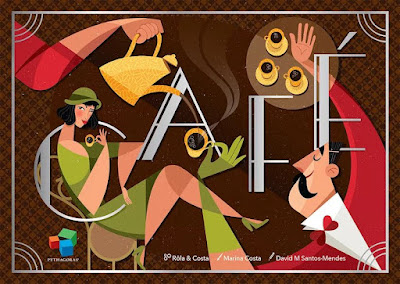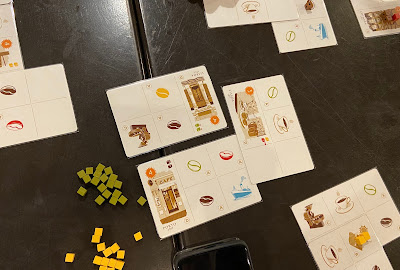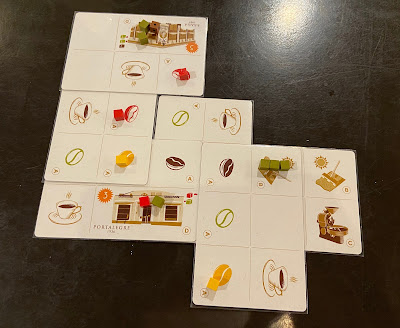The Game
Cafe is a game about planting, processing and selling coffee, and it is
primarily a card game. It is a light medium weight game which works for
players new to boardgames.
Every player gets to build his own little coffee empire. You start with one
card, and every round you will add one more to your empire. Every card has six
segments, and when you add a card, you must cover 2 to 4 segments. The game is
played over 8 rounds, which means by the end of the game you will have 9 cards
in your play area. On your turn you always have 3 options to pick from. After
picking a card and placing it, you perform actions. In the beginning you only
have 1 action on your turn. When you add more coffee cups to your empire, your
actions per turn increase accordingly. In the example above, I have four
actions per turn.
Every player has his own warehouse card. The white cube indicates the number
of actions you may perform every turn. The smaller coffee cubes at the bottom
are your stockpile of coffee. Coffee in your warehouse scores points at game
end. The colour with the fewest cubes scores 2 points per cube. The second
lowest colour scores 1 point per cube. There is no point having many cubes in
just one or two colours. It doesn't help much in scoring.
4 players is the highest player count. The game does take up some space at the
table. When we played, there were a few times we ran out of space and needed
to carefully shift our piles of cards to make space without messing up our
empires.
You always have 3 cards to pick from. Once you pick a card, a new one is drawn
so that the next player still has three to pick from. Even if you take a card
he wants, the new card might be good for him too.
The cards feature different icons with different abilities. The four types of
actions you get to perform represent different stages in the coffee production
process. Firstly you get to produce coffee beans. You pick any group of
connected coffee beans, and you add a cube to every empty segment in the
group. Now that you have produced coffee, you can harvest and dry them. You
pick any group of drying spaces, and for each space you can move in one type
of bean, e.g. all green beans in the photo above. After drying, you get to
make coffee. You pick a group of coffee machines (in this example I only have
a single machine), and each machine can take one coffee type from all drying
spaces. Finally you deliver coffee to cafes and your warehouse. For this last
step the cafes need not be connected. You can deliver from any or all coffee
machine spaces to all cafes and your warehouse.
Cafes and the warehouse score points at game end. Cafes score only if you
fulfil their requirements.
This cafe needs a red and a green coffee cube, and is worth 3
points.
Coffee cups are generally good. More cups = more actions. However whenever you
claim a card with a cup, you must pay a coffee from your warehouse. You start
the game with four different coffee cubes in your warehouse. If you take your
sweet time processing coffee, you can still claim up to four cards with cups,
till your opening stock runs out. If you manage to get two ships in your
empire (see above), you no longer need to pay cubes when taking coffee
cups.
The Play
How to pick a card and how to place it is a fun challenge. You must cover at
least two segments, so it means sometimes you are forced to cover something
that's useful. It's not always easy to decide what to sacrifice. Sometimes
when you place a card, you already need to plan for where you want to place
the next one. You want to group the plantations together, the drying spaces
together, and the coffee machines together, and this is not always easy to do.
Cafe has a spatial element.
By the time you get to performing actions, it is relatively straight-forward.
It is not hard to optimise. Still fun, just not very taxing. You want to get
the most out of your limited actions. E.g. you probably want to use up all the
cubes at the plantations before producing again, so that you maximise the
amount your produce.
There are only two sources of victory points - your cafes and your warehouse.
You need to strike a balance between them. You certainly need to fight for
cafes so that you don't fall behind. When picking cafes you must consider your
production capacity. Don't go for cafes which need colours you are weak in.
You also need to keep in mind the situation at your warehouse. You want to
keep the colours balanced. If you are particularly lacking in a certain
colour, you not only need to boost production in that colour, you also need to
avoid taking cafes needing that colour.
Cafe is a little multiplayer solitairish. You don't
directly interfere with the other players' empires. You can at most take
the cards they are desperate for. The action phase of your turn is so
independent that once you've picked your card, the next player can already
start his turn while you place your card and perform your actions. Even Tommy
who was new to boardgames commented that we couldn't really attack one
another.
Cafes score between 2 to 5 points.
Tommy, me, Ivan, Jessyca. All of us were new to the game. This was my first
time gaming with them too.
At the end of the game I had 5 cafes, and I managed to fulfil all their
requirements.
These were the cubes in my warehouse at game end. The lowest colour was red.
At 2 points per cube, that means red scored 4 points. The other colours were
tied for second lowest so it didn't matter which colour I picked. At 1 point
per cube, I scored 4 points for my second lowest colour. So my warehouse
scored a total of 8 points.
The Thoughts
Cafe reminds me of Patchistory, a game from Korea which was
quite popular when it came out in 2013. I have not tried it, but I know it
has a similar card stacking mechanism. I enjoy this aspect of Cafe.
It is satisfying to be able to connect a huge group of plantations and
produce a ton of coffee beans with just one action. This is a light strategy
game which works for players new to the hobby. If you are not bothered about
the low player interaction, give it a go.












2 comments:
It looks like an entertaining game, but with very complicated rules. I've always been in favour of simpler and more dynamic games, where you can play several games in a short period of time.
The rules are mostly straight-forward. I'm probably making it sound more difficult than it really is.
Post a Comment